
Gravitation & Cosmology
metrics 2024
Innovating Insights in Astronomy and Astrophysics
Introduction
Gravitation & Cosmology is a vital academic journal founded to explore the profound concepts of gravitation and the dynamics of the universe. Published by MAIK NAUKA/INTERPERIODICA/SPRINGER, this journal features a comprehensive range of research articles, reviews, and theoretical insights that advance the field of astronomy and astrophysics. With a current impact factor reflective of its esteemed contribution, Gravitation & Cosmology operates within the upper tier of its discipline, classified as Q3 in Astronomy and Astrophysics for 2023. Although not an open-access publication, the journal fosters a vibrant community of scholars and practitioners by providing rigorous peer-reviewed content accessible through various academic platforms. Covering converged years from 2008 to 2024, this journal serves as an indispensable resource for anyone keen on deepening their understanding of gravitational phenomena and cosmological theories. Researchers, professionals, and students alike will find valuable insights and innovative research that push the boundaries of contemporary astrophysical knowledge.
Metrics 2024
 0.33
0.33 1.20
1.20 0.90
0.90 22
22Metrics History
Rank 2024
Scopus
IF (Web Of Science)
JCI (Web Of Science)
Quartile History
Similar Journals
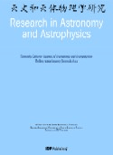
Research in Astronomy and Astrophysics
Charting New Territories in Astrophysical Research.Research in Astronomy and Astrophysics, published by the National Astronomical Observatories under the Chinese Academy of Sciences, stands out as a pivotal platform for disseminating cutting-edge research in the fields of astronomy and astrophysics. With an ISSN of 1674-4527 and an E-ISSN of 2397-6209, this esteemed journal operates as an open access publication, ensuring that high-quality research is available to a broad audience without any financial barriers. As of 2023, it holds a commendable Q2 quartile ranking in both Astronomy and Astrophysics, as well as Space and Planetary Science, reflecting its importance and revered position among leading journals. Spanning from 2009 to 2024, it is geographically rooted in the United Kingdom but engages a global readership and author base, making significant contributions to the rapidly evolving discourse in astrophysical studies. Moreover, its rankings in Scopus underscore its relevance, ranking 43rd out of 90 in Astronomy and Astrophysics and 61st out of 104 in Space and Planetary Science, placing it firmly within the competitive landscape of scientific research. Research in Astronomy and Astrophysics is dedicated to fostering innovation and communication within the scientific community, offering researchers, professionals, and students alike a valuable resource for collaboration and knowledge advancement.
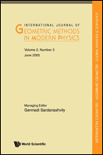
INTERNATIONAL JOURNAL OF GEOMETRIC METHODS IN MODERN PHYSICS
Illuminating the Geometric Foundations of Theoretical PhysicsINTERNATIONAL JOURNAL OF GEOMETRIC METHODS IN MODERN PHYSICS is a leading academic publication dedicated to the interdisciplinary exploration of geometric methods in the realms of modern physics. Published by WORLD SCIENTIFIC PUBL CO PTE LTD, this esteemed journal is based in Singapore and acts as a critical platform for researchers, professionals, and students seeking to delve into the intricacies of modern theoretical physics and its geometric foundations. With an impressive Scopus ranking placing it in the 64th percentile of its category, the journal highlights innovative research and developments from 2005 to 2024 within its scope. While currently not offering Open Access, it remains a vital resource for the dissemination of valuable knowledge in its field, contributing significantly to the advancement of physics and astronomy. We encourage the academic community to explore this exceptional journal for cutting-edge insights and to further enhance their understanding of geometric applications in modern scientific inquiry.

ANNALES HENRI POINCARE
Connecting Scholars Worldwide in the Quest for KnowledgeANNALES HENRI POINCARE is a prestigious journal published by Springer International Publishing AG, dedicated to advancing research in the fields of Mathematical Physics, Nuclear and High Energy Physics, and Statistical and Nonlinear Physics. With an impressive Q1 ranking in its respective categories as of 2023, this journal is recognized as a vital resource for academic researchers, professionals, and students engaged in frontier studies of theoretical and applied physics. The journal's commitment to high-quality peer-reviewed articles promotes significant contributions to the understanding of complex physical phenomena, making it essential reading for anyone seeking to stay abreast of developments in these dynamic fields. Additionally, ANNALES HENRI POINCARE offers open access options to enhance the visibility and accessibility of groundbreaking research, underscoring its role in fostering collaborative scientific inquiry and innovation. Since its inception in 2000, it has continually provided a platform for scholars worldwide to disseminate their findings and engage with the broader scientific community, thus establishing itself as a cornerstone of academic literature.
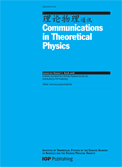
COMMUNICATIONS IN THEORETICAL PHYSICS
Pioneering research for a deeper understanding of physical laws.COMMUNICATIONS IN THEORETICAL PHYSICS is a distinguished journal published by IOP Publishing Ltd, focusing on the broad and evolving field of theoretical physics. With an ISSN of 0253-6102 and an E-ISSN of 1572-9494, this journal provides a platform for the dissemination of innovative research that contributes to the understanding of complex physical concepts. Situated in the United Kingdom, it has established itself as a pivotal resource from 1996 to 2024, achieving a commendable Q2 ranking in the category of Physics and Astronomy (miscellaneous) for 2023. With a Scopus ranking of #18 out of 81 in its category, demonstrating a 78th percentile, this journal plays a crucial role in enhancing scholarly communication among researchers, professionals, and students alike. Although it does not currently offer Open Access options, the journal's comprehensive scope and commitment to high-quality peer-reviewed research underline its significance in the scientific community, making it an essential reading for anyone engaged in theoretical physics.

Living Reviews in Relativity
Unveiling the Latest in Relativity ResearchLiving Reviews in Relativity, published by SPRINGER INT PUBL AG, stands at the forefront of the field of relativity, offering a dynamic platform for the dissemination of high-quality, peer-reviewed research. Since its inception in 1998, this Open Access journal has committed to providing continuous updates and comprehensive reviews, making it an indispensable resource for researchers and scholars in the categories of Physics and Astronomy, where it holds a prestigious Q1 ranking. With its impressive Scopus ranking of #1 out of 81 in the Physics and Astronomy (miscellaneous) category, it boasts a remarkable 99th percentile ranking, underscoring its significance in advancing scientific discourse. Operating out of Switzerland, Living Reviews in Relativity serves as a vital conduit for sharing knowledge and insights, fostering collaborative research, and promoting timeless discussions in the ever-evolving landscape of relativistic physics.
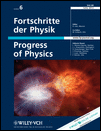
FORTSCHRITTE DER PHYSIK-PROGRESS OF PHYSICS
Connecting Ideas and Innovations in the World of PhysicsFORTSCHRITTE DER PHYSIK-PROGRESS OF PHYSICS, published by WILEY-V C H VERLAG GMBH, is a prestigious academic journal esteemed within the field of physics. With a history spanning over seven decades since its inception in 1953 and a converged publication up until 2024, this journal has established itself as a leading source for groundbreaking research and developments across diverse domains in physics and astronomy. Holding an influential Q1 ranking in the 2023 category of Physics and Astronomy (miscellaneous), it serves as an essential platform for disseminating high-quality research findings and theoretical advancements. Although not an Open Access publication, FORTSCHRITTE DER PHYSIK provides access to critical insights and scholarly discussions that are pivotal for researchers, professionals, and students alike. The journal is committed to contributing to the evolution of knowledge in physics, supporting the academic community through rigorous peer-reviewed articles, reviews, and innovative studies.
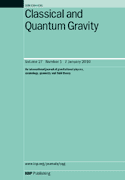
CLASSICAL AND QUANTUM GRAVITY
Elevating Understanding of Gravity Across DimensionsCLASSICAL AND QUANTUM GRAVITY is a prestigious journal published by IOP Publishing Ltd, positioning itself at the forefront of research in the domain of theoretical physics, particularly focusing on gravitational theories in both classical and quantum frameworks. With an impressive Q1 rank in the field of Physics and Astronomy, it has established a significant academic presence since its inception in 1984. This journal offers a platform for disseminating high-quality research findings and critical reviews, playing a pivotal role in advancing our understanding of the foundations of gravitational physics. Researchers and professionals alike will find this scholarly publication an invaluable resource for staying abreast of the latest developments in gravitational theory, quantum gravity, and related interdisciplinary studies. Despite the absence of open access options, its vibrant print and online presence ensures that contributions are accessible to the global scientific community. With a commitment to fostering innovation in an area that remains central to modern physics, CLASSICAL AND QUANTUM GRAVITY continues to attract cutting-edge research that shapes the future of gravitational studies.
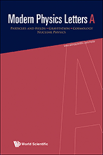
MODERN PHYSICS LETTERS A
Driving Innovation in Physics Through Scholarly DialogueMODERN PHYSICS LETTERS A, published by World Scientific Publishing Co Pte Ltd, is a distinguished journal in the field of physics that serves as a pivotal platform for researchers, professionals, and students alike. With ISSN 0217-7323 and E-ISSN 1793-6632, the journal has gained international acclaim for its contributions to Astronomy and Astrophysics as well as Nuclear and High Energy Physics. The journal is ranked in Q3 for both Astronomy and Astrophysics and Nuclear and High Energy Physics, showcasing its relevance in these areas, while also achieving a Q2 ranking in the broader category of Physics and Astronomy (miscellaneous). Spanning from 1996 to 2024, MODERN PHYSICS LETTERS A promotes open dialogue and dissemination of pioneering research findings and innovative theories. While the journal operates without an open access option, its rich content is easily accessible through various academic databases, ensuring that vital research is shared widely among the scientific community. Situated in Singapore, this journal plays an essential role in the continuous advancement of the physics discipline, fostering collaboration and knowledge sharing among global researchers.

Journal of Cosmology and Astroparticle Physics
Charting New Frontiers in Astroparticle ResearchThe Journal of Cosmology and Astroparticle Physics (ISSN: 1475-7516) is a premier publication in the field of astronomy and astrophysics, dedicated to advancing our understanding of the cosmos through innovative research. Published by IOP Publishing Ltd in the United Kingdom, this journal has established itself as a vital resource for researchers, professionals, and students alike, with an impressive Scopus rank of #11/90, placing it in the top 12% of its field. The journal aims to foster the dissemination of groundbreaking studies related to cosmology, dark energy, particle physics, and the universe's fundamental structure, making it a key player in shaping contemporary astrophysics discourse. With a Category Quartile of Q2 as of 2023, it continues to attract high-quality contributions that enhance scholarly dialogue. As an accessible platform, it engages a diverse audience interested in the frontiers of astrophysical research, encouraging collaboration and knowledge sharing among the global scientific community.
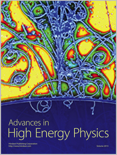
Advances in High Energy Physics
Illuminating the Path of High Energy Physics InnovationAdvances in High Energy Physics, published by HINDAWI LTD, is a premier open-access journal dedicated to the progressive field of Nuclear and High Energy Physics. With an ISSN of 1687-7357 and an E-ISSN of 1687-7365, this journal has been at the forefront of scientific discourse in high energy physics since its inception in 2007. The journal is notable for its impact within the community, currently holding a Q2 ranking in 2023 and positioned at #36 out of 87 in its category according to Scopus, highlighting its significant contribution to ongoing research and advancement in the field. Its accessible nature enables researchers, professionals, and students to engage with cutting-edge findings that shape our understanding of the universe. Spanning publications from 2010 through 2024, Advances in High Energy Physics serves as an invaluable resource for those looking to stay informed about the latest developments and methodologies in high energy physics across the globe.